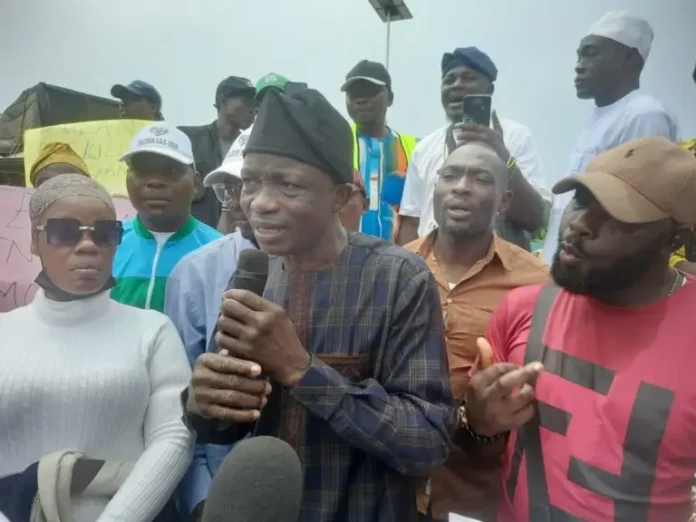News Investigators/ The Yoruba Self-Determination Movement (YSDM) has urged President Bola Tinubu to intensify efforts to end insecurity across the South-West zone.
Leaders and members of the Yoruba socio-cultural group made the call during a peaceful protest on Friday in Lagos.
The protesters also demanded that the Federal Government remove the name of Yoruba Nation agitator, Chief Sunday Adeyemo, popularly known as Sunday Igboho, from its wanted list.
Speaking during the protest, which was held under police watch at the 7Up Tollgate, Opeoluwa Akinola, a leader of the group, said many farmers in rural areas still live in fear of kidnappers and bandits.
He stressed the need for urgent and decisive government action against criminal attacks, adding that the crisis between herders and farmers had persisted for too long.
“As we speak, no fewer than 24 communities have been affected,” Akinola said.
On Adeyemo, he described the agitator as a “son of the soil” who had shown unwavering commitment to protecting the region.
According to him, Adeyemo could contribute significantly to community-led security initiatives if given institutional backing and recognition.
Mrs Funmilayo Ogunniyi, a women leader in the Ifelodun Apapo Omo Yoruba group, commended the efforts of security agencies but said more must be done to protect families and livelihoods.
“Many kidnappings are happening around South-West borders,” she said.
Mr ‘Loluwa Ologun, a youth leader, urged political leaders to rise above partisan divides to confront what he described as a “national monster.”
“Insecurity has grown into a monster. This is not the heritage our forebears left us.
“We refuse to accept a Nigeria where Yoruba sons and daughters live as strangers in their own land,” he said.
The protest follows President Bola Tinubu’s recent approval of a state pardon for 175 Nigerians, an exercise described by the Presidency as part of efforts to promote national reconciliation.
Among those pardoned were the late nationalist Herbert Macaulay and former FCT Minister, Maj.-Gen. Mamman Vatsa (rtd.), who was executed in 1986.
Also granted posthumous clemency were environmental activist Ken Saro-Wiwa and eight members of the Ogoni Nine executed under the Abacha regime in 1995.
In addition, 65 inmates had their sentences reduced, seven death sentences were commuted to life imprisonment, and 82 inmates received presidential clemency.
According to the presidency, the move reflects the government’s commitment to restorative justice and the rule of law.
Analysts say YSDM’s demand for Adeyemo’s delisting from the wanted list aligns with the spirit of forgiveness reflected in the presidential pardon.
They note that extending clemency to the Yoruba agitator could strengthen trust between the government and communities seeking greater security and autonomy.
For many protesters, such a gesture would combine justice with compassion and reinforce Tinubu’s image as a leader committed to peace and inclusion.
As insecurity continues to challenge the region, YSDM says only decisive leadership and reconciliation can guarantee lasting safety for the people of the South-West.
NAN


